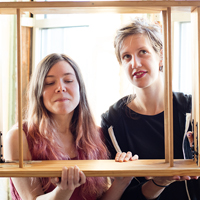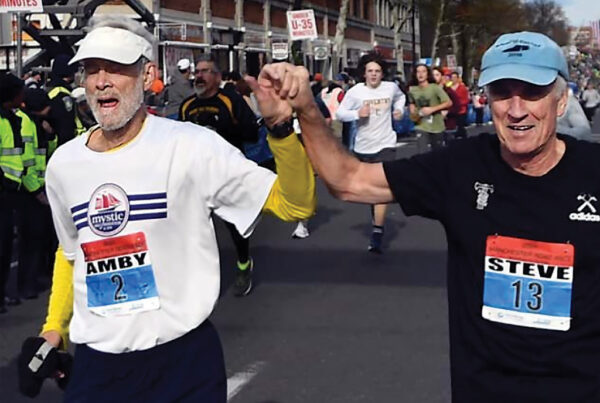From Global Pandemic to Anti-Racism: 2020 in Review
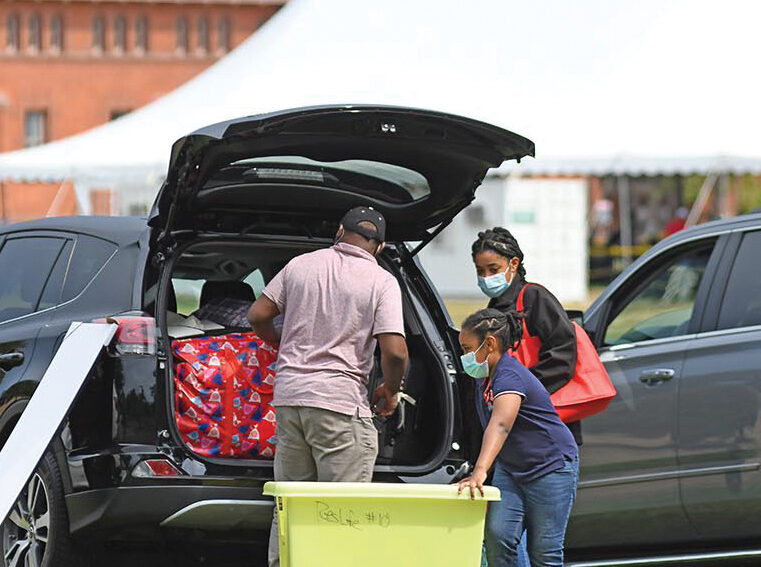
2020 will undoubtedly go down in history as one of the most memorable years of the modern era. From the threat and real-life toll of a global pandemic to domestic clashes over social, racial, and political injustice, it was a year full of challenges. In this timeline, we look back and explore some of the University community’s accomplishments amid an evolving pandemic.
Editor’s Note: An expanded version of this article originally appeared in News@Wesleyan.
JANUARY 21: The Jewett Center for Community Partnerships announces grantees of the JCCP Student Innovation Fund. Students from a range of majors and backgrounds—all with shared interests in utilizing resources in innovative ways to positively impact the greater Middletown community—applied to this fund.
FEBRUARY 2: In response to the World Health Organization’s announcement of an outbreak of a novel coronavirus, Wesleyan’s Chinese community (particularly students and parents) bands together to help their fellow citizens. The student-initiated group WesInAction raises more than $23,000, which is used to purchase medical equipment for hospitals in the pandemic’s epicenter in Hubei province, China.
 FEBRUARY 16: WesInAction delivers seven sets of oxygen concentrators and ventilators and 26,000 pairs of medical gloves to the First People’s Hospital of Xiaochang County and the People’s Hospital of Dawu County in Xiaogan, Hubei province.
FEBRUARY 16: WesInAction delivers seven sets of oxygen concentrators and ventilators and 26,000 pairs of medical gloves to the First People’s Hospital of Xiaochang County and the People’s Hospital of Dawu County in Xiaogan, Hubei province.
FEBRUARY 19: Students who spent winter break supporting voter registration, participating in political campaigns, and working with advocacy groups as part of Wesleyan’s Engage 2020 (E2020) initiative gather in Allbritton Hall to share their reflections. E2020 is a comprehensive University effort to support student learning via civic engagement and liberal arts education.
MARCH 12: As the Centers for Disease Control and Prevention report thousands of known cases of the novel coronavirus (COVID-19) nationwide, Wesleyan transitions all classes to distance-learning models for the remainder of the spring semester. Athletic contests are canceled. All University-sponsored, -connected, or -funded domestic and international travel for students, faculty, and staff is prohibited.
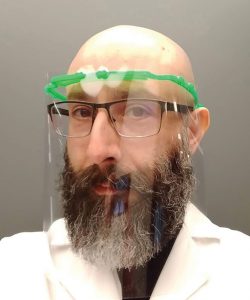 APRIL 6: To help medical personnel safeguard themselves during the coronavirus outbreak, two makerspace labs on campus manufacture much-needed protective masks using 3D printers. Wesleyan donates its first set of 100 face shields to medical personnel at Middlesex Hospital in Middletown.
APRIL 6: To help medical personnel safeguard themselves during the coronavirus outbreak, two makerspace labs on campus manufacture much-needed protective masks using 3D printers. Wesleyan donates its first set of 100 face shields to medical personnel at Middlesex Hospital in Middletown.
APRIL 20: Wesleyan establishes a College of Education Studies, along with a new linked major in Education Studies. Rooted in a liberal arts framework, the new College will foster interdisciplinary scholarship of education studies that is connected to practice and policy.
MAY 1–2: Rather than allowing the COVID-19 pandemic to force a final curtain call on theatrical productions, Wesleyan’s Theater Department pivots to an online format. The department offers livestreamed performances of The Method Gun, featuring 10 student-actors. After countless hours of line rehearsals, overcoming technical frustrations, and learning how to act and teach theater in a virtual world, show director and Assistant Professor of Theater Katie Pearl says, “I almost can’t believe what we pulled off.”
MAY 20: Brianna Johnson ’24 is the recipient of the Hamilton Prize for Creativity, which comes with a four-year, full-tuition scholarship to attend Wesleyan.
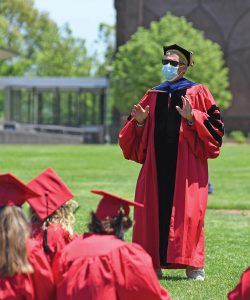 MAY 24: For the first time in its history, Wesleyan University holds its Commencement virtually, awarding 771 Bachelor of Arts degrees. Streamed on both the Wesleyan website and on Facebook, the ceremony—the University’s 188th—sees more than 3,000 family, friends, faculty, staff, and alumni gather together online for a common moment in celebration of the members of the Class of 2020.
MAY 24: For the first time in its history, Wesleyan University holds its Commencement virtually, awarding 771 Bachelor of Arts degrees. Streamed on both the Wesleyan website and on Facebook, the ceremony—the University’s 188th—sees more than 3,000 family, friends, faculty, staff, and alumni gather together online for a common moment in celebration of the members of the Class of 2020.
MAY 25: George Floyd, a 46-year-old Black man, is killed during his arrest in Minneapolis, sparking nationwide demonstrations. Members of Wesleyan’s administration and alumni speak out against racial injustice and offer resources for community members. Wesleyan President Michael Roth ’78 shares a blog post titled “Build an Anti-Racist Community in Which Hatred and Intolerance Have No Place.”
JUNE 22: President Roth announces that the University plans to resume in-person classes in the fall, pending the ongoing recommendations of University, state, and federal health and safety experts.
AUGUST 24: Wesleyan welcomes students back to campus during the week of August 24. Due to the COVID-19 pandemic, Residential Life stretches Arrival Day activities over the span of seven days, and students are assigned a formal arrival date and time to minimize crowds and allow for appropriate social distancing. Only students may enter residences during the move-in period. Students are asked to take a COVID-19 test prior to leaving home, and must be tested again upon arrival. They will be tested twice per week throughout the semester.
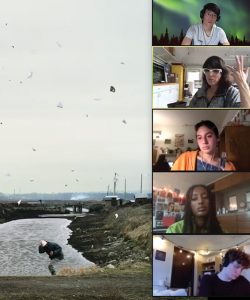 AUGUST 31: Classes begin and all students are in a required quarantine until September 6. Faculty teach classes remotely or through a hybrid system using multiple platforms, including Zoom and Moodle.
AUGUST 31: Classes begin and all students are in a required quarantine until September 6. Faculty teach classes remotely or through a hybrid system using multiple platforms, including Zoom and Moodle.
SEPTEMBER 1: Wesleyan finalizes plans to hold in-person classes on campus in both indoor and outdoor classroom settings. More than 180 classrooms have been rearranged in order to achieve a minimum six-foot distance between occupants. In addition, break times are expanded to 30 minutes or more to allow for custodians to disinfect all touchable surfaces in each classroom between classes.
SEPTEMBER 4: In response to the killing of George Floyd, Student Activities and Leadership Development (SALD) hosts a four-part series of Black Lives Matter–themed workshops celebrating the contributions of the Black community
at Wesleyan.
SEPTEMBER 15: Following a carefully coordinated return to campus and an initial period of remote learning during Connecticut’s mandated two-week quarantine, the University reports that just two students and three employees at Wesleyan have tested positive for
COVID-19 to date. More than 15,000 tests have already been conducted.
SEPTEMBER 18: Three weeks into the fall semester, Wesleyan students are adapting to the “new normal” during the COVID-19 pandemic. Face coverings or masks are required in all public spaces to help reduce the spread of the virus. Some students find the masks also can serve as a fashion accessory or statement piece.
OCTOBER 10: Wesleyan’s careful planning, creative problem-solving, and exemplary adherence to safety protocols result in the campus community staying together this semester. For the third week in a row, Wesleyan reports 0 cases of COVID-19.
OCTOBER 16–17: Wesleyan parents, alumni, faculty, staff, and students gather together virtually to celebrate Homecoming and Family Weekend. Participants are treated to popular WESeminars, live campus tours, a parents’ assembly, two symposiums, and more—all from the comfort of their own homes.
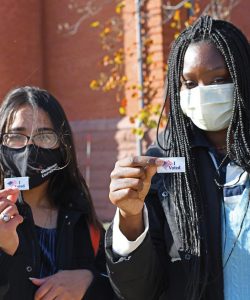 NOVEMBER 3: Approximately 600 students, faculty, staff, and local residents vote at Middletown’s Voting District 14, located inside Beckham Hall in Fayerweather. In addition, Matt Lesser ’10; Wesleyan employee Amy Bello; John Hickenlooper ’74, MA ’80, Hon. ’10; Alex Kasser ’88; and Michael Demicco ’80 win seats in their respective elections.
NOVEMBER 3: Approximately 600 students, faculty, staff, and local residents vote at Middletown’s Voting District 14, located inside Beckham Hall in Fayerweather. In addition, Matt Lesser ’10; Wesleyan employee Amy Bello; John Hickenlooper ’74, MA ’80, Hon. ’10; Alex Kasser ’88; and Michael Demicco ’80 win seats in their respective elections.
NOVEMBER 9: Jeopardy! fans around the world mourn the passing of longtime host Alex Trebek, who died on November 8 at age 80. Many Wesleyans had the opportunity to compete on Jeopardy! over the years.
NOVEMBER 17: With the holiday season approaching, Wesleyan’s Pandemic Planning Committee (PPC) reminds students, faculty, and staff to remain vigilant and safe. Connecticut Governor Ned Lamont rolls the state back to “phase 2.1,” reinstating many restrictions on both indoor and outdoor gatherings. Wesleyan continues to follow state and federal guidance closely. The COVID-19 testing site moves indoors to Beckham Hall for the winter season.
DECEMBER 17: More than 25 students in Fred Cohan’s Global Change and Infectious Disease course have pandemic-related op-eds published in national media outlets. Cohan, professor of biology and Huffington Foundation Professor in the College of the Environment, assigns the op-ed writing as part of his course and offers students extra credit if they are able to get their work published.
Top photo: Arrival Day activities were stretched out over the week of August 24, due to the pandemic. Photos by Olivia Drake MALS ’08.

